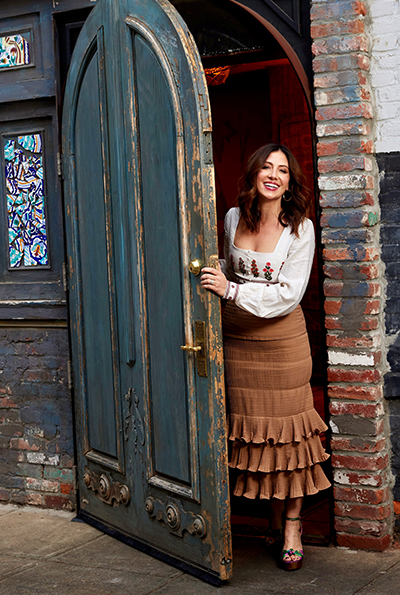
Rose Previte, the Restaurant Association of Metropolitan Washington’s Restaurateur of the Year, is the keynote speaker for the Schar School of Policy and Government’s 2024 Degree Celebration taking place Friday, May 10, at George Mason University’s EagleBank Arena in Fairfax, Virginia.
The sea of green caps and gowns at the arena will be a familiar one to Previte: In 2007, she graduated from the Schar School with a Master of Public Policy degree that she credits for her early success in opening her first restaurant in 2014, Washington, D.C.,’s famed Compass Rose, a perennial entry on major “best restaurants” lists.
Since then, her No White Plates company includes, in addition to Compass Rose, the Michelin-starred, fire-based cuisine of Maydān, the Middle East-themed Medina, and the Eastern Mediterranean Kirby Club in the Mosaic District of Fairfax, Virginia, as well as Go There Wines, which brings to market wines created by women and underrepresented winemakers.
For Previte (it rhymes with “edit”), all of her businesses tell stories through food and wine, reflecting her Ohio upbringing and her marriage to former NPR anchor and reporter David Greene. Her Lebanese mother ran a catering company while her Sicilian father sold Italian sausage sandwiches at street fairs and festivals. She traveled with her husband to some 30 countries during his radio career, where she sampled the wares of street and stall vendors, not realizing those tasty memories would be the eventual menu of Compass Rose.
Her first cookbook, Maydān: Recipes from Lebanon and Beyond (Abrams Books, 2023), which debuted in November, is an extension of that storytelling. ”It’s all the home recipes from the last 10 years as well as recipes from the restaurants,” she said. “The base of it actually is all the stuff I grew up eating with my mom and my family.”
Her arrival to Washington after completing undergraduate studies at Ohio Northern University in 2003 came with the determination to change what she could in the public realm.
“I was there for the [George W.] Bush years and we had the Iraq war, and Afghanistan was on everybody’s minds, and Bush was very unpopular. And here I am moving to D.C. from very conservative Ohio and I want to, like, fight ‘the man.’”
To win that figurative fight, she needed to know how. A degree in public policy made sense, so she enrolled for graduate courses at the Schar School.
“One thing I always appreciated about Mason in my graduate studies was the diversity of the classroom,” she said. “I ended up appreciating the range of opinions in every classroom, which I don’t think is common at other schools in the area where there’s so much leaning one way or another.
“And the fact that we had super liberals, military officers, people in nonprofit—it was just such a range of people in the room. That was just such a cool experience, with the conversations, the debates, the group projects—no one thought the same way, and to me, that's what school is for, right?
“As the world's become more polarized, that's probably more important than it ever has been.”
The engaging classroom experience led to real-life public policy work. While at Mason, she traveled to New Orleans to assist on an independent study on how the city could recover after Hurricane Katrina. She also interned for D.C. City Council member Jack Evans, who was leading the effort to fund a new Major League Baseball stadium for the Washington Nationals.
After completing her Mason degree, Previte earned a fellowship that allowed her to work for the Arlington County manager for a year. From there she relocated to New York City and worked for the speaker of the city council before moving to Russia with her husband, who became NPR’s Moscow correspondent.
The somewhat peculiar idea of a famed restaurateur earning a master’s degree in public policy isn’t lost on her.
“I get asked this a lot when I’m invited on panels,” she said. “But ask yourself, what are the challenges of opening a business? Being a first-time, young, female business owner in D.C. was excruciatingly hard.”
Obtaining a liquor license, for instance. Neighbors, many of whom happened to be Washington lawyers and bold face names, “they were very—I’m trying to think of a nice word—persnickety, if you will, about who was coming into the neighborhood in 2014. And they did not want Compass Rose there.”
She fought “the man.” And won.
“I always tell everybody how helpful it was to have a policy degree at that point because I had to navigate the bureaucracy of D.C. permits: Liquor license hearings in front of the ABC Board. I had to go in front of the community and to city council hearings and things like that.”
The Schar School degree and her real-world experience came in handy when it was time to obtain the building permits and the business license, she says.
“I didn't have enough money to hire someone to get my permits for me,” she said. “I had to go down to City Hall all of the time. I did all that by hand, which a lot of people don't do, and I actually kind of enjoyed it because I got to see the policy in action.
“After working for the City Council and after working in my fellowship in Arlington County, I got to be on the other side of it. And I was like, ‘I know why you guys made this law. And actually, I don't agree.’ And now here I am on the other side of the laws that I helped write.
“So that was an interesting experience.”
